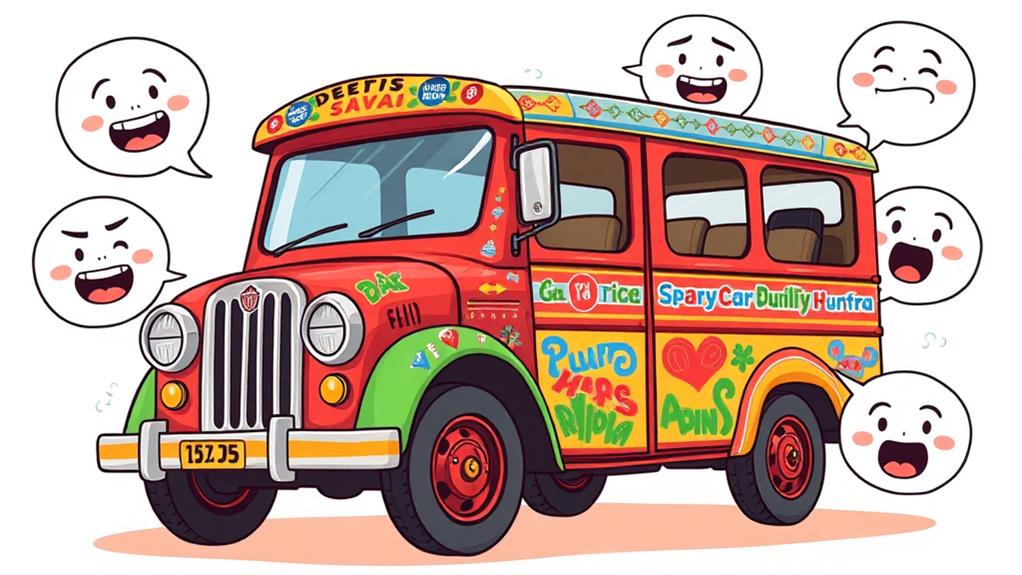Mastering Tagalog Slang: 3 Essential Words
To sound like a native Filipino speaker, it's crucial to know kilig, a term that describes the giddy feeling of excitement or having a crush.
For example, "Ang kilig ng movie na 'yan!" translates to "That movie is so exciting!" This word is often used to express enthusiasm or infatuation.
Lodi is another essential Tagalog slang word that conveys respect and admiration for someone.
When you call someone lodi, you're acknowledging their exceptional skills or achievements. For instance, "Si LeBron James ang lodi ko sa basketball" means "LeBron James is my idol in basketball."
Lastly, beshie is a term of endearment for close friends.
It's a way to affectionately address your buddies, similar to "buddy" or "pal." For example, "What's up, beshie?" is a casual greeting among friends.
Essential Tagalog Slang Expressions

Mastering Essential Tagalog Slang Expressions
To sound like a true-blue Filipino, it's crucial to know five essential Tagalog slang expressions: kilig, lodi, beshie, petmalu, and charot. These words will help you connect with locals and sound more natural in everyday Tagalog conversation.
Kilig is the giddy feeling you get when you're crushing on someone or experiencing something exciting. For example, you can say "Ang kilig ng movie na 'yan!" (That movie is so kilig!) to express your enthusiasm.
Lodi is used to show respect and admiration for someone you look up to. For instance, "Si LeBron James ang lodi ko sa basketball" (LeBron James is my lodi in basketball).
Beshie is a term of endearment for your closest friends. You can use it to start a conversation, such as "What's up, beshie?".
Petmalu is perfect for describing something that's extremely impressive. For example, "Ang petmalu ng fireworks display sa New Year's Eve!" (The fireworks display on New Year's Eve was petmalu!).
Charot is used to let others know you're just joking around.
Frequently Used Tagalog Slang Words
Mastering Tagalog Slang Words for Authentic Conversations
Beyond essential expressions, learning frequently used Tagalog slang words is crucial to making your conversations more authentic. These words are commonly used in everyday conversations, especially among friends.
Common Filipino Slang Words and Their Meanings
Kilig refers to the feeling of excitement or butterflies in the stomach. For example, if someone shares a romantic story, you can say "Ang kilig!" (That's so exciting!).
Lodi is used to describe someone admired or looked up to. If you meet someone you admire, you can call them "Lodi" (Idol).
Charot means "just kidding" and is used to lighten the mood. When joking around, throw in a "Charot" to clarify you're not serious.
Nyek is a playful way to say "oops" when making a mistake or error. If you accidentally spill something, just say "Nyek" with a laugh.
Using these slang words will make you sound like a native speaker, and you might even impress your Filipino friends with your skills!
How Do Tagalog Idioms Reflect or Relate to Commonly Used Slang Words?
Tagalog idioms and their cultural meanings are deeply rooted in everyday Filipino life, often mirroring the humor, values, and struggles of the people. Many commonly used slang words stem from these idioms, modernizing traditional expressions while preserving their cultural essence, bridging the old with the new in Filipino communication.
Descriptive Tagalog Slang Terms

Descriptive Tagalog Slang Terms to Elevate Your Conversations
Impressive and Cool: Petmalu
To describe something extremely impressive or cool, use the slang term Petmalu. For example, if someone pulls off an epic stunt, you can say "Ang petmalu mo!" (You're so cool!).
Smooth and Suave: Swabe
The term Swabe means smooth or suave. Use it to compliment someone's charm or style, like "Ang swabe mo sa party kahapon!" (You were so charming at the party last night!).
Irresistibly Delicious: Rapsa
Foodies will love the term Rapsa, which describes food that's irresistibly delicious. When you try something amazing, say "Ang rapsa nito!" (This is so delicious!).
Confidence Boost: Keri
To express confidence in a situation, use the term Keri, which means you've got this.
Talkative: Taratitat
If someone's being too chatty, call them Taratitat, a humorous way to describe a talkative person.
These descriptive Tagalog slang terms will help you connect with the Filipino culture and show your appreciation for its unique flair.
Frequently Asked Questions
What Is a Pinoy in Slang?
What does "Pinoy" mean in slang?
It refers to someone who takes pride in Filipino culture.
When people say "Pinoy," they're talking about embracing the unique aspects of being Filipino. This includes Pinoy humor, which is known for being witty and lighthearted.
It also involves loving traditional Filipino food, such as adobo and lechon. Additionally, Pinoy music is a big part of the culture, with its catchy rhythms and melodies.
The term "Pinoy" is about embracing the Filipino lifestyle, which includes fashion, traditions, and even the unique way of speaking.
It's a celebration of the vibrant entertainment and way of life that's distinctly Filipino.
What Is Amazing in Tagalog Slang?
What's amazing in Tagalog slang is "petmalu." This phrase is used to describe something that's totally mind-blowing or impressive. It's widely used in modern Filipino slang, especially among the youth, and is often seen in social media and everyday conversations.
Tagalog slang is constantly evolving, with new words and phrases emerging all the time. This evolution reflects the country's vibrant cultural identity.
For example, new phrases and words are created to express emotions, reactions, and opinions, allowing the language to stay fresh and exciting.
What Does "Awit" Mean in Filipino Slang?
"Awit" in Filipino slang means expressing dismay or disappointment.
In Filipino, "awit" literally translates to "song." However, in informal contexts, it has taken on a different meaning. When someone says "awit," they're expressing sympathy or empathy, similar to saying "aww, that's painful" or "ouch."
You'll often see "awit" used in casual conversations, social media posts, and memes to convey sadness or disappointment.
For example, if someone shares a bad news, a friend might respond with "awit" to show sympathy.
The origins of "awit" as an expression of dismay blend English and Tagalog.
It's a lighthearted way to convey sadness or disappointment without being too serious.
What Is the Filipino Slang for Girl?
Filipino slang for a girl includes terms like "bes", "mars", "teh", "sis", and "beshie".
When referring to a female friend or someone you're interested in, you can use these terms in casual conversations.
For instance, you can call her "bes" or "mars" when chatting or hanging out, giving off a relaxed and friendly vibe.
Alternatively, you can use "teh" or "sis" to show that you're close and part of a fun group.
If you're feeling extra close, you can even call her "beshie" to capture a special moment.